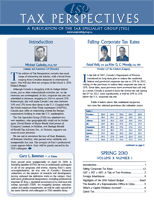
PDF Format
 Issue Contents Issue Contents
 All Issues All Issues
Spring 2010
Volume 10, Number 1
The information in Tax Perspectives is prepared for general interest only. Every effort has been made to ensure that the contents are accurate. However, professional advice should always be obtained before acting and TSG member firms cannot assume any liability for persons who act on the basis of information contained herein without professional advice.
Quick Tax
By Manu Kakkar, CA, CGA, TEP
Manu Kakkar CA Inc. (London, Ontario; Montreal, Quebec)
The Garron Family Trust Case
Two Barbados resident trusts were set up by non-residents to benefit Canadian families. The trusts owned shares in certain Canadian corporations in which these families were founding shareholders. The trusts had obtained the shares in an estate freeze. When sold in 2000, the two Barbados trusts filed Canadian returns but claimed that, because they were not Canadian residents, the capital gain was treaty-exempt. The Court ruled that the two trusts were factually resident in Canada because the two Canadian principals managed and controlled the trusts in substance and the trustee in Barbados was merely "following orders."
This court decision is potentially relevant for interprovincial planning arrangements. Often, trusts are established in Alberta to take advantage of the lowest personal tax rates in Canada. The CRA has been asking Alberta trustees where the central management and control of such trusts reside. Establishing Alberta trusts needs careful planning to ensure they won't be considered resident in a higher-tax province where the beneficiaries actually live.
CRA Audits Domestic Trusts
The CRA recently announced plans to audit domestic inter vivos trusts. These types of trusts often own shares of private corporations or have investment portfolios, and facilitate income splitting among lower-income beneficiaries. One of the CRA's concerns is that trustees, usually one or both parents, may make personal use of trust funds. In such cases, the CRA may deny related tax deductions or assess a benefit to the parents. To preserve a trust's income-splitting benefits, trustees should keep proper accounting records and trust minutes, and attend to the necessary formalities of the trust arrangement.
CRA Attacks Kiddie Tax Avoidance Plans
The "kiddie" tax imposes the highest rate of personal tax on minors who receive dividends from private corporations. To reduce the tax payable, tax planners have devised several types of plans, one of which resulted in capital gains, which are not subject to the kiddie tax. The CRA has been auditing these strategies and, on occasion, invoking the General Anti-Avoidance Rule to re-characterize such distributions to minors as dividends subject to the kiddie tax. No doubt the courts will be passing judgment on this soon.
| 






